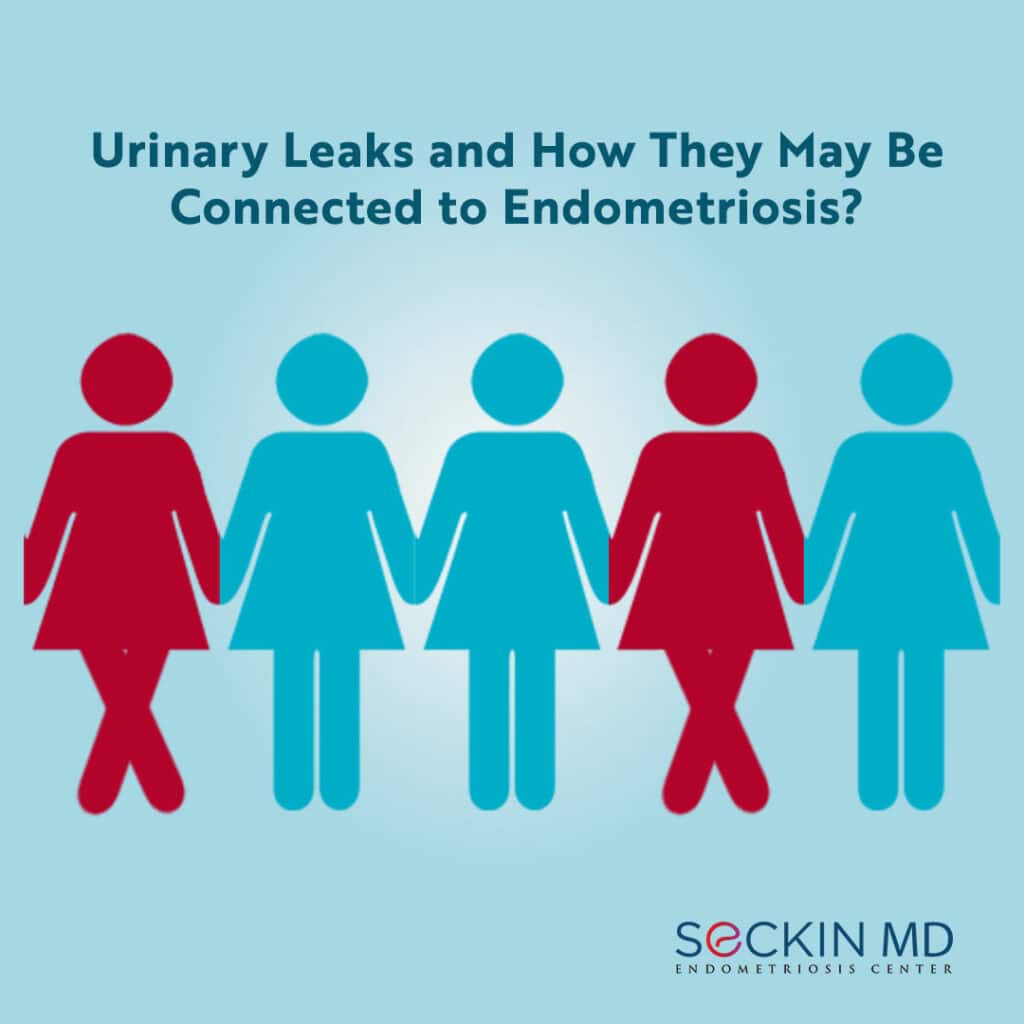Urinary Leaks and How They May Be Connected to Endometriosis?

Endometriosis can affect many areas outside of the uterus. One of these areas is the urinary tract in which lesions occur in the bladder, ureters, and kidneys. One of the main symptoms of bladder endometriosis is urinary leaks.
How does the bladder function?
Typically, the passage of urine is under the control of the sympathetic and parasympathetic nervous systems. The sympathetic (fight or flight) nerves regulate urine storage in the bladder. The parasympathetic (rest and digest) nerves, on the other hand, control bladder muscle contraction and passage of urine.
A duct called the urethra carries urine from the bladder to the outside of the body. The sphincter muscles guard the opening of the urethra. This prevents leakage and open only when the bladder muscle contracts under a signal from the brain.
What is urinary incontinence?
With urinary incontinence, individuals experience urinary leaks and often do not have enough time to get to a toilet. This is known as urge incontinence. Urinary incontinence can also happen under the mildest of stresses such as coughing or sneezing as well. This is known as stress incontinence. Urge and stress incontinence may also occur together and are not exclusive of one another, which can add to the distress of urinary incontinence and complicate its treatment.
What causes urinary leaks?
Urinary incontinence is more of a symptom than a disease in itself. Anyone can experience urinary leaks. However, they are more common in women as pregnancy and menopause can lead to weakened pelvic muscles over time.
Urinary incontinence can have many causes. These include diet, urinary tract infections, constipation, stress, pregnancy and childbirth, age, menopause, neurological disorders, obstruction in the urinary tract, and endometriosis.
What are the types of urinary incontinence?
There are four types of urinary incontinence. These are stress urinary incontinence, urge incontinence, mixed incontinence, and overflow incontinence.
Stress urinary incontinence (SUI)
SUI happens during physical activities as the pelvic floor muscles become weak and are no longer able to support organs in the pelvic cavity including the bladder. Activities such as coughing, sneezing, running, laughing, lifting, and jumping place stress on the bladder causing urine to leak since there is no strong pelvic muscle support.
The severity of SUI can range from mild to severe. Kegel exercises can help strengthen the pelvic floor muscles. Adopting lifestyle changes, vaginal and urethral devices, and surgery can also help
Urge incontinence
This is also known as overactive bladder (OAB) and is characterized by an intense urge to urinate followed by involuntarily urine leakage. OAB affects around 30% of men and 40% of women in the U.S. Individuals with OAB often feel the urge to urinate even when the bladder is not full, including at night.
OAB often results in prostate problems in men and as a result of menopause in women. Lifestyle changes, drugs to relax the bladder, and surgery can help manage OAB.
Mixed incontinence
In mixed incontinence, individuals leak urine during physical activity (SUI) and also experience an extreme urge to urinate (OAB).
Overflow incontinence
People with overflow incontinence make more urine than the bladder can hold or cannot fully empty their bladder. As a result, some urine always keeps dripping over time. It is more common in men with a large prostate and those with chronic conditions such as stroke or multiple sclerosis.
Additionally, factors such as physical or mental impairments can result in the person not being able to get to the toilet in time. This is known as functional incontinence.
How can bladder endometriosis cause urinary leaks?
Bladder endometriosis can result in an overactive bladder or urge incontinence and lead to urinary leaks. Other symptoms include pain during a full bladder, irritation, or even blood in the urine.
Researchers reported the first case study of mixed incontinence (stress and urge incontinence) associated with bladder endometriosis in 2014. The patient had an 18-month history of mixed incontinence and refused surgery. Doctors administered dienogest, a progestin-only oral contraceptive, to treat endometriosis and noticed significant improvements in both endometriosis and urodynamic symptoms.
A recent study of 1,161 women — of which 520 had endometriosis and 641 did not — ages 7 to 55 looked at the association between endometriosis and lower urinary tract symptoms (LUTS). Almost half (43.8%) of the participants with endometriosis reported LUTS. Compared to those without endometriosis, women with endometriosis had higher odds of showing urinary incontinence, difficulty in passing urine, hematuria, dysuria, frequent urination, feeling full even after urination, or a combination of these symptoms.
Can doctors treat urinary leaks due to endometriosis?
Urinary incontinence may be managed with medications to stabilize bladder muscle contractions. Hormone replacement therapy may also help restore bladder function. Lifestyle changes such as avoiding caffeine, performing regular Kegel exercises, timing toilet visits, and maintaining a healthy body weight may also help manage urinary incontinence.
Severe urinary incontinence not responsive to medical or surgical interventions can also be managed using devices such as indwelling catheters and external urine collecting systems that drain into urine drainage bags.
If endometriosis is the main reason for urinary incontinence, treating the disease with laparoscopic deep excision surgery can improve or even irradicate the symptom. Surgeons at the Seckin Endometriosis Center use laparoscopic deep excision surgery to address both superficial and deep bladder endometriosis.
Do you experience urinary leaks? Do you also have endometriosis? Please share your story by leaving a comment on our post on Facebook or Instagram.
Get a Second Opinion
Our endometriosis specialists are dedicated to providing patients with expert care. Whether you have been diagnosed or are looking to find a doctor, they are ready to help.Our office is located on 872 Fifth Avenue New York, NY 10065.
You may call us at (646) 960-3080 or have your case reviewed by clicking here.